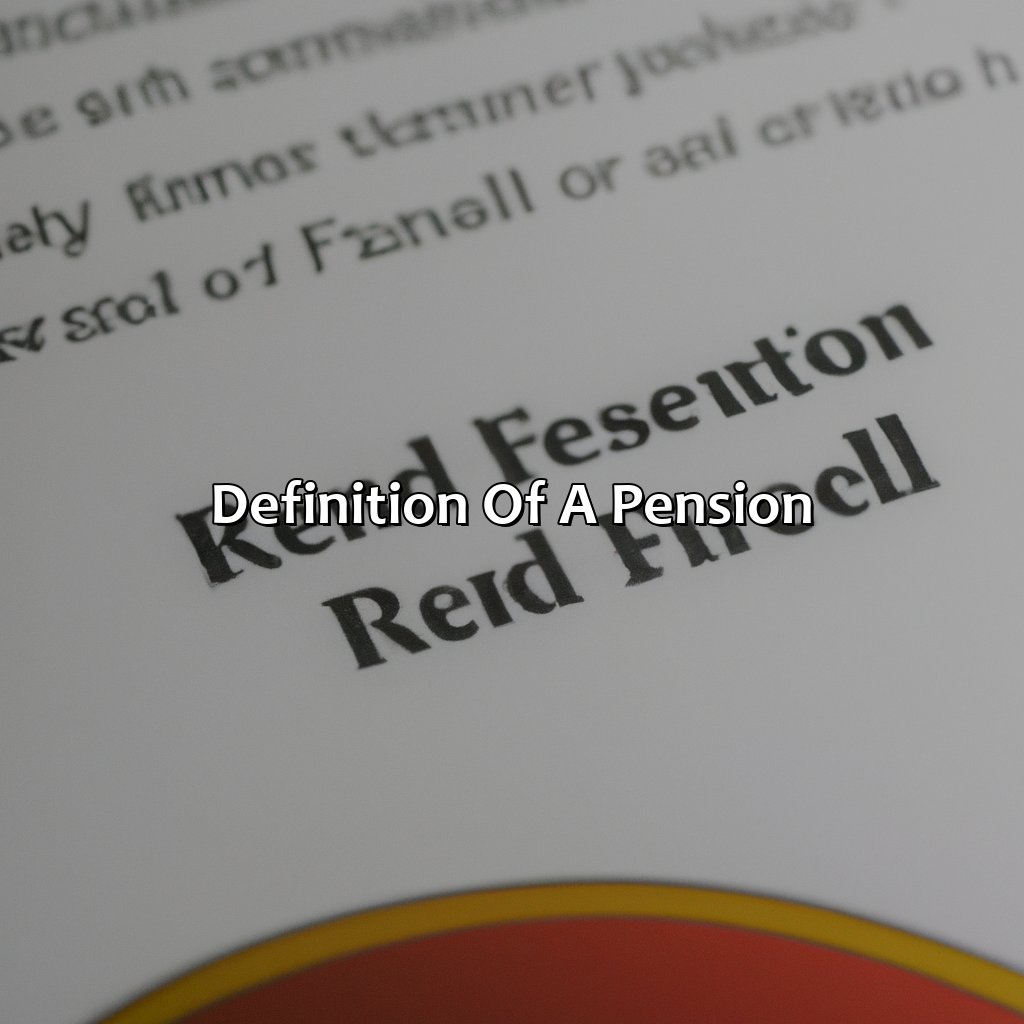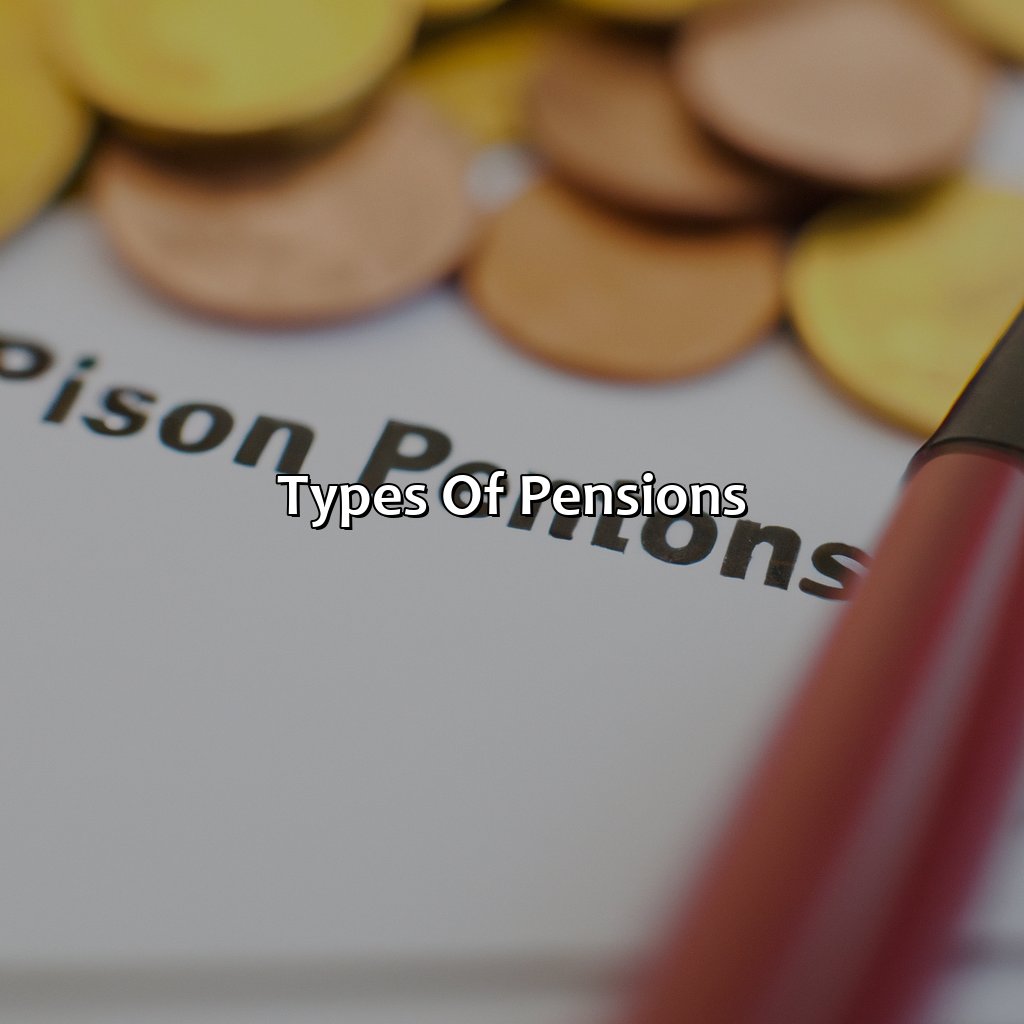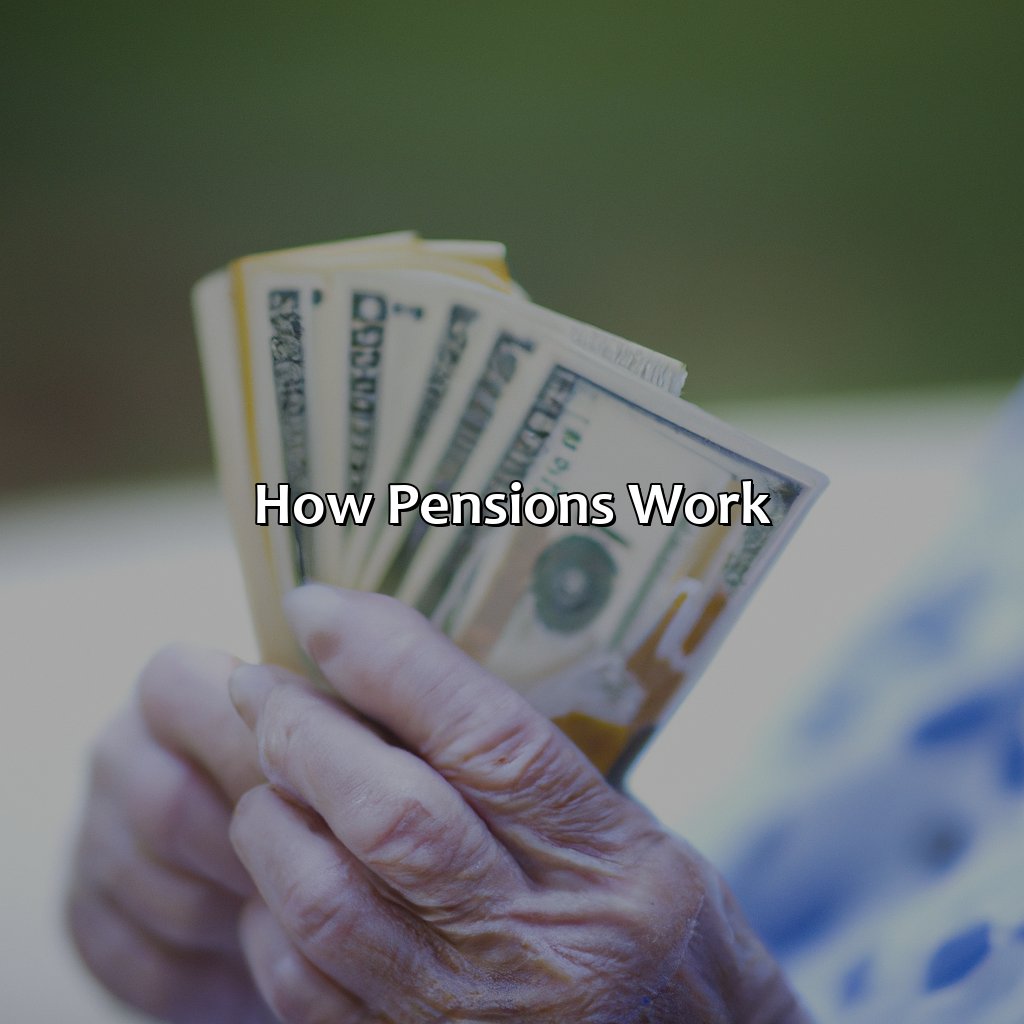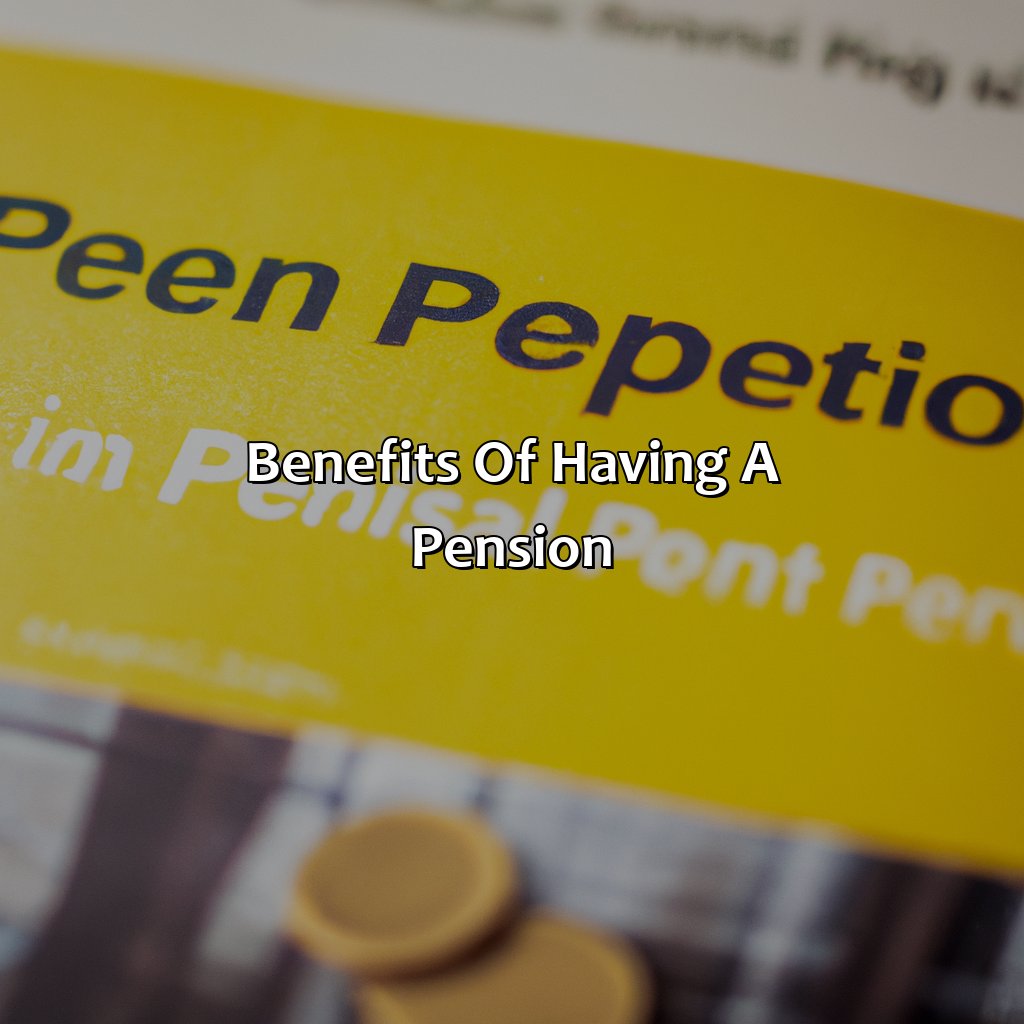What Is S Pension?
Key Takeaway:
- A pension is a retirement plan that provides a fixed income to individuals who have contributed to the plan during their working years.
- There are two main types of pensions: defined benefit pensions, which guarantee a specific amount of income in retirement, and defined contribution pensions, which allow individuals to make contributions and invest the funds for retirement income.
- Pensions have eligibility requirements, such as age and length of service, and contributions are typically made by both the employee and employer. Pensions are funded through investments made by the pension plan.
- The benefits of having a pension include financial stability in retirement and tax benefits. Pensions provide a reliable source of income in retirement and can provide tax advantages, such as tax-deferred contributions and lower tax rates in retirement.
Are you unsure of what a pension is and how it can help you in the long-run? This article will help you understand the basics of a pension plan and how to make the most of it. You can secure a financially stable future with the right pension plan.
Definition of a Pension
A pension plan is a type of retirement plan that provides a steady income to a retired person. It is a form of savings that an individual makes during their working years. This type of plan is usually set up by an employer, and can be either defined benefit or defined contribution.
Pension plans are designed to provide financial security to retired individuals. They aim to provide regular income to the retiree throughout their lifetime. The amount of pension that an individual receives depends on several factors, including their age, how long they have been contributing to the plan, and the type of pension scheme they have.
If you’re interested in finding out more about pension plans, you may want to look into what is the UK state pension and how it works.
It is important to note that pension plans have evolved over time. In the past, most workers had access to defined benefit plans, which promised a specific payout amount upon retirement. However, in recent years, defined contribution plans – like 401(k)s – have become more popular. These plans allow employees to contribute money to their retirement account, and the employer may also choose to make contributions.
If you’re interested in more information about retirement plans, you may want to learn about what a SSAS pension is and how it may benefit you.
Historically, pension plans were more common in the public sector than in the private sector. However, in recent years, many companies have decided to discontinue their pension plans due to the rising costs associated with them. Instead, they have opted to offer defined contribution plans as a way to provide retirement benefits to their employees.

Image credits: retiregenz.com by Joel Washington
Types of Pensions
To grasp the two principal pensions – Defined Benefit Pension and Defined Contribution Pension – typically offered to employees, investigate this section – Types of Pensions. Each subsection details the solution a particular pension type provides.
Image credits: retiregenz.com by Adam Washington
Defined Benefit Pension
A Defined Benefit Pension is a type of pension plan where the employer bears the investment risk and promises to pay a guaranteed amount to the employee upon retirement. The amount an employee receives is usually based on their salary and years of service, with formulae varying by employer. This type of pension plan is considered one of the most secure for employees as it provides a fixed income stream.
In contrast to other types of pensions, such as Defined Contribution or Cash Balance plans, there is no account balance that can fluctuate due to market conditions. The formula for determining how much an employee receives takes into account factors like years of service and length of time until retirement age. In this way, Defined Benefit Pensions can be seen as more predictable for employees.
One unique aspect of Defined Benefit Pensions is that they are generally funded by employers rather than both employers and employees. This means that employees do not contribute money toward their retirement account like they would in a Defined Contribution plan. However, this also means that participants have less control over how funds are invested than if they had a Defined Contribution plan.
Pro Tip: It’s important for individuals with a Defined Benefit Pension to understand their benefit calculations and vesting schedule to fully maximize their retirement benefits.
A defined contribution pension is like a magic trick – you put money in and *poof* it disappears into the abyss of the stock market.
Defined Contribution Pension
A defined contribution pension plan is a retirement plan where an individual contributes a set amount of money to their account, which can then be invested in various assets. The final value of the retirement benefit depends on the performance of those investments. Employers may also contribute to the employee’s account, but they are not responsible for meeting specific payout amounts.
These types of pensions have become increasingly popular in recent years as traditional pension plans become less common. With a defined contribution pension, individuals have more control over their retirement savings and can make decisions about how they want to invest their money. However, this also means that they bear more risk if investments do not perform as expected.
One unique feature of defined contribution pensions is that they allow participants to transfer their account balances when changing jobs or retiring. This flexibility allows individuals to keep track of their retirement savings even as their employment status changes. According to Forbes, as of 2020, nearly 90% of Fortune 500 companies offer some form of defined contribution plan as part of their benefits package.
Retirement planning is like playing a game of chess, except you don’t have any control over the pawns and the final move is always retirement home checkmate.
How Pensions Work
Grasping pensions? You must understand the eligibility prerequisites, how contributions are paid, and how pensions are funded. This guide will give you the insight to manage pensions and make wise decisions.

Image credits: retiregenz.com by David Woodhock
Eligibility Requirements
For one to access a pension, certain criteria must be met. These conditions are based on factors such as age, time worked, and income contributed. Meeting the eligibility requirements guarantees that an individual can receive payments from their pension plan.
The first requirement is often related to age. Generally, individuals must reach a particular age before accessing their pensions fully. Additionally, one may have to serve a minimum length of service or make specific contributions towards the pension scheme.
It’s essential to note that each pension plan may have its unique eligibility criteria. Therefore, it’s wise for individuals to confirm and understand what they’re required to do before accessing their Category A State Retirement Pension fully.
To maximize your benefits while minimizing the risk of running out of funds after retirement, it’s necessary to keep track of your investments regularly. Failure to meet eligibility requirements or not contributing enough could lead to reduced payouts during retirement years; thus there’s a need for prudence during employment years when contributing towards a pension plan.
Contributions to your pension fund may be tax-deductible, but unfortunately, your contributions to your drinking fund are not.
How Contributions are Made
Contributing to your pension plan is vital for a comfortable retirement. One way to do this is through employer automatic enrolment, another method is a government backed savings platform known as the National Employment Savings Trust (NEST).
Pension plans are typically funded through contributions made by both the employee and the employer, whereby the employee agrees to set aside a percentage of their salary into the plan each month and the employer matches this contribution or contributes some amount on top. Automated paycheck deductions may be available as well. The contributions are then invested with the aim of achieving growth over time.
To learn more about pension plans, including what is ER pension, check out our website.
It’s important to take note of any annual limits on contributions set by HM Revenue & Customs if you earn over a certain threshold as your pension could be taxed. Learn more about EE pension and its benefits.
Managing your contributions effectively can lead to significant boosts in savings during retirement, so it’s wise to regularly review investment options and keep track of your progress towards retirement goals without relying solely on just one type of pension fund.
Why save for retirement when you can just rely on the kindness of strangers? Oh wait, that’s not how pensions work.
How Pensions are Funded
Pension financing refers to the means through which funds are accumulated to pay future benefits to retirees.
Typically, a pension fund is supported by contributions from both employees and employers. These contributions are then invested in various securities or assets that generate income for the fund. The amount of money contributed, as well as investment earnings, greater determines the growth of a pension plan.
Aside from contributions and investments, some pension funds may receive government subsidies or additional support from specialized institutions such as insurance companies. These supports help meet required funding levels.
It’s important to note that understanding your pension and its funding is crucial for financial planning in retirement.
If you are wondering about what is a SERP pension, it is a type of pension plan that provides benefits based on your final salary and years of service. It is important to consult with a financial advisor to determine if this type of plan is right for you and your retirement goals.
Pro Tip: Evaluate your pension plan regularly to ensure you’re on track with your goals at retirement age. Getting old may suck, but having a pension is like having a trusty sidekick in the fight against wrinkles and gray hair.
Benefits of Having a Pension
Pension with tax benefits can help you achieve financial stability in retirement. This section talks about the advantages of having a pension and dives into two topics:
- Financial Stability in Retirement
- Tax Benefits

Image credits: retiregenz.com by David Washington
Financial Stability in Retirement
Financial Stability in Retirement
Retirement is a crucial aspect of life that requires financial stability to ensure smooth sailing. Planning for a secure financial future is important, and having a steady income post-retirement through a Semantic NLP pension provides peace of mind.
Pensions offer several benefits, including:
- Increased personal savings
- Lower tax implications
- Professional fund management services
These benefits allow people to save for retirement diligently while minimizing tax burdens and maximizing returns on investments. In addition, since pensions are managed by professionals with years of experience, they rely on sound investment strategies that diversify the portfolio’s risk and maximize long-term growth potential.
Moreover, Pensions have unique features like automatic enrollment, employer contributions, and portability. One fascinating element is how easy it is to make contributions as most employers automatically enroll their employees into pension plans without many formalities. Also, employers usually provide contributions as incentives along with benefits packages. Additionally, if an employee changes jobs or careers at some point in life, it’s still possible to continue contributing to his/her account elsewhere easily.
However, if you are looking for specific information about a TPI Pension, it’s important to know that it’s a type of disability pension that is typically offered to individuals who have served in the military.
Your pension may be taxable, but at least you’ll have something left to pay the bill with.
Tax Benefits
One of the advantages of pension schemes is the unique tax incentives they offer to contributors. These incentives assist individuals in saving effectively towards their retirement years while also minimizing their tax liability. Under these plans, contributions are typically made from income before taxes have been paid, allowing for reduced taxable income. Additionally, any investment returns or capital gains on the pension fund are free from tax. This allows for significant long-term savings and helps protect against possible future taxation changes.
Furthermore, pension plans provide a variety of other benefits in addition to favorable tax treatment. Retirement can be costly, and it’s critical to plan ahead. A defined benefit plan arrangement offers a guaranteed sum for life once you retire; it often includes disability payments should you become ill or injured, as well as survivor benefits which continue payments to your named beneficiary if you pass away before receiving all your entitlements.
On top of that, some employers match employee’s contributions up to specific thresholds levels. That means workers get a higher return on their money without doing anything else on the employer side. If you’re wondering what ERS pension is on your payslip, it’s important to understand how your contributions are being matched by your employer.
Interestingly enough, pensions dates back to Bismarck’s Germany and were initially established as part of an effort to improve living conditions for older citizens while also encouraging younger people to support them financially through payroll taxes – A plan which proved successful, spread throughout several other countries in Europe and eventually across much of the globe.
Some Facts About What Is Pension:
- ✅ A pension is a retirement plan that provides specific benefits to employees or their beneficiaries upon retirement. (Source: The Balance)
- ✅ Pensions can be contributed to by both the employer and employee, or by just the employer. (Source: Investopedia)
- ✅ Pensions can be based on a defined benefit, where the benefit is pre-determined, or on a defined contribution, where the employee contributes a set amount and the benefit is based on investment returns. (Source: Pension Benefit Guaranty Corporation)
- ✅ Many employers have been scaling back or eliminating pension plans, opting for 401(k)s or other retirement savings plans instead. (Source: CNBC)
- ✅ Pensions are often a valuable source of income in retirement, providing a stable stream of income that is not subject to market risks. (Source: Nolo)
FAQs about What Is S Pension?
What is a pension?
A pension is a retirement plan that provides a predetermined amount of money to an employee upon retirement. It is typically funded by both the employer and the employee during the employee’s working years.
How does a pension work?
A pension plan is essentially a savings plan for retirement. The employer and employee contribute a fixed amount of money into the pension plan throughout the employee’s working years. The money in the pension plan is invested, and upon retirement, the employee receives a regular income from the plan.
What are the types of pensions?
There are two main types of pensions: defined benefit and defined contribution. A defined benefit plan is a pension plan where the employer promises to pay an employee a specific amount of money upon retirement. A defined contribution plan is a pension plan where the employee contributes to the plan during their working years, and the amount of money they receive upon retirement depends on the returns earned on the investments in the plan.
Who is eligible for a pension?
Eligibility for a pension depends on the specific pension plan and the employer. Some employers offer pensions to all employees, while others only offer pensions to certain employees or managers.
What are the benefits of a pension?
One of the main benefits of a pension is the security it provides in retirement. With a pension, an employee is guaranteed a certain amount of money upon retirement. Additionally, pensions often come with tax benefits, as contributions to the plan are typically tax-deductible.
Can I contribute to a pension on my own?
Individuals can contribute to their own pension plans in the form of an individual retirement account (IRA) or a solo 401(k). These plans operate similarly to traditional pensions, but the employee is responsible for making contributions to the plan.
